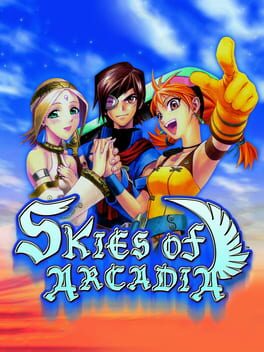As far as graphics, animations and cutscenes go, Overworks upped the ante with Skies of Arcadia, a steampunk JRPG with turn-based systems for both land and flight battles. Half of the appeal - however, lies in its unusual place in history (thanks mainly to its platform, caught between 5th-gen values and the budding 6th generation), allowing a glimpse into future standards enabled by advancing tech. If they weren't the first (Quest 64 and Panzer Dragoon Saga are potential sources), they could still receive credit for bridging that era with the modern third-person style of JRPG (which gradually replaced the overhead/static camera of its past), an approach that also downplayed vague progression (the old method to pad out playthroughs) in favor of lengthy jogs down pathways. This turned out to be important in setting a new (dubious) template for the next generation. Winding and distinctive towns clash with its massive, airship-navigated void and some of the least imaginative dungeons ever, but a greater case of mixed results is found in their systems & mechanics. On one hand, its arena combat - that feels like a 3D mix of Chrono Trigger (reliance on AoE skills) and Star Ocean (movement half-determined by targeting) minus the ATB flow, at least features a party-wide SP gauge for both magic and supers (with bosses that lead to careful meter management and planning), whereas their dogfights utilize the same tools in a slower, more linear format. On the other hand, its spell-learning (by way of elemental weapon augments) recreates FFVI's espers via FFVII's materia, while the rest (collectibles, Suikoden-esque recruitment, world map secrets, optional bosses, etc.) amounts to a checklist of filler.
But above all else, it's the presentation that triumphs: The prevailing sense of scale, the vibrant animations, the cinematic nuances, the stunning landscapes (or more appropriately - skyscapes), and the expressive character models embody the state-of-the-art of its genre & times, if only in visuals. And as it proceeds, the journey is enriched by the chemistry and moving speeches of its party members, whose relentless optimism harks back to the original spirit of console-RPGs. For better and for worse, this work represents a further step in production quality previously set by the likes of Xenogears, Chrono Cross, Final Fantasy IX and The Legend of Dragoon.
But above all else, it's the presentation that triumphs: The prevailing sense of scale, the vibrant animations, the cinematic nuances, the stunning landscapes (or more appropriately - skyscapes), and the expressive character models embody the state-of-the-art of its genre & times, if only in visuals. And as it proceeds, the journey is enriched by the chemistry and moving speeches of its party members, whose relentless optimism harks back to the original spirit of console-RPGs. For better and for worse, this work represents a further step in production quality previously set by the likes of Xenogears, Chrono Cross, Final Fantasy IX and The Legend of Dragoon.
